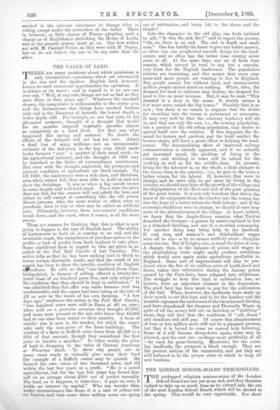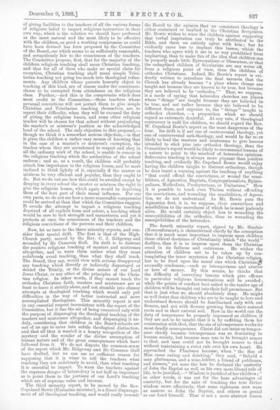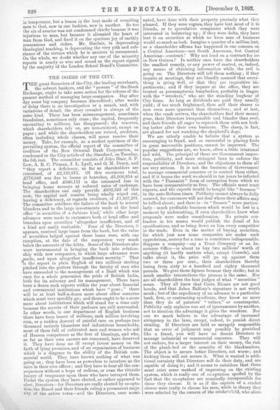THE LONDON SCHOOL-BOARD THEOLOGIANS.
rinu prolonged religious controversies of the London -L School Board are not yet at an end, and they threaten indeed to take up so much time as to extend into the era of the next London School Board, which will be elected in the spring. This would be very regrettable. For short of giving facilities to the teachers of all the various forms of religious belief to impart religious instruction in their own way, which is the solution we should have preferred as the most natural and the most likely to be effective with the children, as good a working compromise as could have been devised has been proposed by the Committee of the Board, one which seems to us sufficiently reasonable, and scrupulously fair to the consciences of the teachers. The Committee propose, first, that for the majority of the children religious teaching shall mean Christian teaching, and that for all of them who make no special claim for exception, Christian teaching shall mean simple Trini- tarian teaching not going too much into theological refine- ments. Any children whose parents honestly object to teaching of this kind, are of course under the conscience- clause to be exempted from attendance on the religious class. Further,—and this is the compromise which does most credit to the Committee,—those teachers whose personal convictions will not permit them to give simple Christian and Trinitarian teaching themselves, are to report their difficulty, when they will be excused the duty of giving the religious lesson, and some other religious teacher will be chosen for that school without prejudicing the master's or mistress's position as the acknowledged head of the school. The only objection to this proposal,— though we think it a somewhat serious objection,—is that it gives the children a rather easy means of knowing that in the case of a master's or mistress's exemption, the teacher whom they are accustomed to respect and. obey in all the ordinary work of the school, is unable to concur in the religious teaching which the authorities of the school endorse ; and so, as a result, the children will probably attach less importance to the religious lesson, and be more inclined to think lightly of it, especially if the master or mistress be very efficient and popular, than they ought to do. But we do not see how this could be avoided except by denying in every school the master or mistress the right to give the religious lesson, which again would be depriving them of the best part of their moral influence. For our own parts, we do not see how a more reasonable compromise could be arrived at than that which the Committee suggest. It avoids the attempt to impart a religious teaching deprived of all explicit form and colour, a teaching which would be sure to lack strength and earnestness, and yet it protects at once the consciences of the teachers and the religious convictions of the parents and their children.
Now, let us turn to the three minority reports, and con- sider their special drift. The first is that of the High- Church party, moved by the Rev. C. J. Ridgeway and seconded by Sir Cameron Gull. Its drift is to distrust the positive religious teaching of masters and mistresses altogether, and to warn them rather what they must sedulously avoid teaching, than what they shall teach. The Board, they say, would view with serious disapproval any teaching which directly or indirectly disparaged or denied the Trinity, or the divine nature of our Lord Jesus Christ, or any other of the principles of the Chris- tian religion. In other words, if they cannot teach the orthodox Christian faith, masters and mistresses are at least to leave it strictly alone, and not stumble into clumsy attempts at theological teaching which would only put difficulties in the way of better instructed and more accomplished theologians. This minority report is not in any essential respect inconsistent with the report of the Committee, but it has the air of being conceived only with the purpose of disparaging the theological teaching of the masters and mistresses altogether, and disparaging it un- duly, considering that children in the Board-schools are not of an age to enter into subtle theological distinction, and that all that is wanted is a hearty recognition of the mystery and the wonder of the divine assumption of human nature and of the great consequences which have followed from it. We do not dispute the common-sense of the report which Mr. Ridgeway and Sir Cameron Gull have drafted, but we can see no sufficient reason for supposing that it is wiser to tell the teachers what teaching they are sedulously to avoid, than what teaching it is essential to impart. To warn the teachers against the supreme danger of heterodoxy is not half so important as to point them to the portions of our Lord's teaching which are of supreme value and interest. The third minority report, to be moved by the Rev. Copeland Bowie (Unitarian minister), is a direct disparage- ment of all theological teaching, and would really commit the Board to the opinion that no consistent theology 19 either contained or implied in the Christian Scriptures. Mr. Bowie wishes to warn the children against supposing that verbal inspiration can truly be attributed to the .Bible, and there we entirely agree with him ; but he evidently cares less to implant this lesson, which the teachers who agree with it are in no way prohibited from implanting, than to make fun of the idea that children can be properly made little Episcopalians or Dissenters, or that the unbaptised children of Secularists are any worse off, from a religious point of view, than the children of orthodox Christians. Indeed, Mr. Bowie's report is evi- dently written to introduce the final sarcasm that the Church has already become "a place where things are taught not because they are known to be true, but because they are believed to be ' orthodox.' " That, we suppose, is a mode of saying that heterodox churches are places. where "things" are taught because they are believed to be true, and not rather because they are believed to be different from, and superior to, the " things" taught in orthodox churches, — a proposition which we should regard as extremely doubtful. At any rate, if theological controvery is unfit for children, we should regard the Rev. W. Copeland Bowie's report as the most dangerous of the four. Its drift is if not one of controversial theology, yet one of controversial anti-theology, and would be far more likely to lead the masters and mistresses to give lessons intended to stick pins into orthodox theology, than the Committee's report would be likely to recommend lessons of a nature to point to the mischief of heterodox opinions. Subversive teaching is always more piquant than positive teaching, and evidently Mr. Copeland Bowie would enjoy having the children taught to distrust orthodoxy, though he does insert a warning against the teaching of anything "that could offend the convictions, or wound the sensi- bilities, of Agnostics, Baptists, Congregationalists, Episco- palians, Methodists, Presbyterians, or Unitarians." How it is possible to teach even Theism without offending the convictions, and wounding the sensibilities, of Agnos- tics, we do not iunderstand. As Mr. Bowie puts the i Agnostics first, t s, we suppose, their convictions and sensibilities to the sacredness of which he is most jealously alive. He would certainly object less to wounding the susceptibilities of the orthodox, than to wounding the susceptibilities of the heterodox.
The fourth minority report, signed by Mr. Sinclair (Nonconformist), is characterised chiefly by the conception that it is much more important to impress upon children those ethical doctrines of Christianity which "the world " dislikes, than it is to impress upon them the Christian creed in its fullness and entireness. He wishes the attention of children not to be taken up by con- templating the inner mysteries of the Christian religio$ but to be fixed upon the moral sins which Christian' avowedly condemns,—such as intemperance and avarice or love of money. By this means, he thinks that the difficulty of conveying lessons which give offence to particular religious denominations will be avoided ; while the points of conduct best suited to the tender age of children will be brought out into their full prominence. But that is just what we should absolutely deny. He might as well insist that children who are to be taught to love and understand flowers should be familiarised only with cut flowers, and not with flowers growing from their natural roots and in their natural soil. How in the world can the duty of temperance be properly impressed on children if they are not to be taught that it is by unfitting them for communion with God, that the sin of intemkierance works it most deadly consequences. Christ did not insist on temper- ance chiefly because intemperance was so desolating to. human society, but because man was to be brought nearer to God, and man could not be brought nearer to God without maintaining a strict rule over his own heart. He reproached the Pharisees because, when " the Son of Man came eating and drinking," they said, "Behold a man gluttonous, and a wine-bibber, a friend of publicans, and sinners," yet none the less he declared the austerity of John the Baptist as well as his own more liberal rule of life, to be justified.—" Wisdom is justified of her children ; " in other words, it was not for the bare advantages of austerity, but for the sake of teaching the true divine wisdom more effectively, that some righteous men were as austere as John the Baptist, and others as genial as our Lord himself. That is not a mere abstract lesson in temperance, but a lesson in the best mode of reuniting men to God, now in one fashion, now in another. So too the sin of avarice was not condemned chiefly because it was injurious to man, but because it alienated the heart of man from God, and fixed it on the spurious joy of earthly possessions and riches. Mr. Sinclair, in deprecating theological teaching, is deprecating the very pith and sub- stance of the virtues which he is anxious to recommend. On the whole, we doubt whether any one of the minority reports is nearly so wise and sound as the report signed by the majority of the London School Board's Committee.








































 Previous page
Previous page